

Blame genetics for bad driving, study finds. Telltale Signs You’ve Got the ‘Love Hormone’ Gene? Can you tell at first glance if someone is likely to be a good partner or parent?
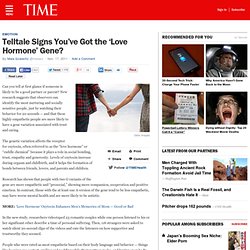
Study Says DNA’s Power to Predict Illness Is Limited. The answer, according to a new study of , is, for the most part, “no.”
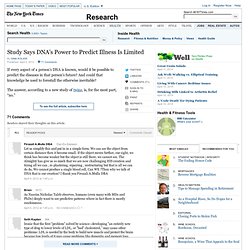
While sequencing the entire DNA of individuals is proving fantastically useful in understanding diseases and finding new treatments, it is not a method that will, for the most part, predict a person’s medical future. So, the new study concludes, it is not going to be possible to say that, for example, will occur with absolute certainty unless a person keeps a normal weight, or that is a foregone conclusion without frequent screening and removal of polyps.
Pfizer Experimental Drug Reduces Autism Signs in Mouse Study. An experimental drug for depression being developed by Pfizer Inc.
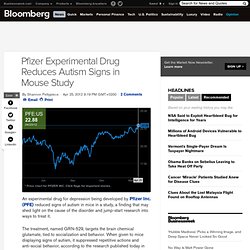
(PFE) reduced signs of autism in mice in a study, a finding that may shed light on the cause of the disorder and jump-start research into ways to treat it. The treatment, named GRN-529, targets the brain chemical glutamate, tied to socialization and behavior. When given to mice displaying signs of autism, it suppressed repetitive actions and anti-social behavior, according to the research published today in the journal Science Translational Medicine. Pfizer and the National Institutes of Health funded the study. There are no drugs on the market to treat the symptoms or causes of autism. Autism's Tangled Genetics Full of Rare and Varied Mutations. The underpinnings of autism are turning out to be even more varied than the disease's diverse manifestations.
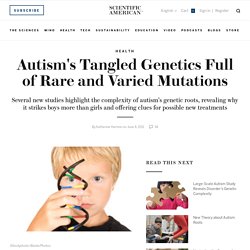
In four new studies and an analysis published June 8 researchers have added some major landmarks in the complex landscape of the disease, uncovering clues as to why the disease is so much more prevalent in male children and how such varied genetic mutations can lead to similar symptoms. Large genetic studies have ruled out the idea that the malfunction of a universal gene or set of genes causes autism.
Identical Twins' Genes Are Not Identical. Identical twins are identical, right?
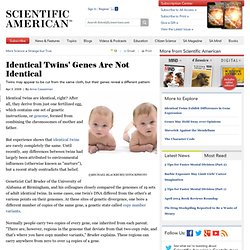
After all, they derive from just one fertilized egg, which contains one set of genetic instructions, or genome, formed from combining the chromosomes of mother and father. But experience shows that identical twins are rarely completely the same. Until recently, any differences between twins had largely been attributed to environmental influences (otherwise known as "nurture"), but a recent study contradicts that belief. High-Frequency Hearing Loss. Peer Pressure. 462 pp.
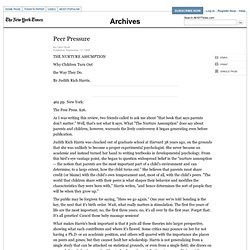
New York: The Free Press. $26. As I was writing this review, two friends called to ask me about ''that book that says parents don't matter.''
Genes & behavior in news. Counsyl Brings Genetic Screening to the Masses. Study suggests breast cancer is clutch of 10 diseases. Scientists who conducted a major international study into the genetics of breast cancer say they can now classify the disease into 10 subtypes - a finding that points to more accurate, tailored treatment for individual patients in future.
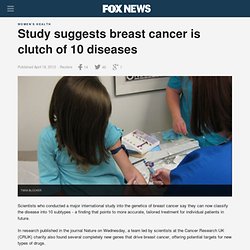
In research published in the journal Nature on Wednesday, a team led by scientists at the Cancer Research UK (CRUK) charity also found several completely new genes that drive breast cancer, offering potential targets for new types of drugs. Carlos Caldas, who co-led the study at CRUK's Cambridge Research Institute and the University of Cambridge said the findings mean breast cancer should now be seen as an "umbrella term" for a larger number of diseases. "Essentially we've moved from knowing what a breast tumor looks like under a microscope to pinpointing its molecular anatomy," he said. "This research won't affect women diagnosed with breast cancer today. Molecular map. Journalist's Resource: Research for Reporting, from Harvard Shorenstein Center. Academia, meet the press.
We live in a world of too much information and not enough knowledge.
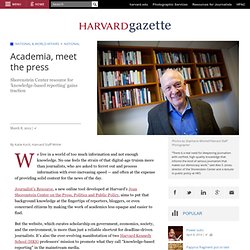
Genetic Disease. Genetic Discoveries. Reproductive technology. Technologies. Eugenics.